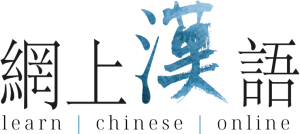Grammar 2
Learn Chinese: grammar 2
Greeting in Chinese
We have seen in the previous lesson that to greet in Chinese we say 你好 nǐhǎo.
What happens if you want to greet your teacher for instance? In English, we say, "Hello Sir", or more rarely "Hello Professor".
In Chinese, it is essential to greet the person by his hierarchical title (teacher, director, etc.) and not by "sir". In addition, the hierarchical title should be placed first : 老师你好! Lǎoshī nǐhǎo ! or more simply 老师好! Lǎoshī hǎo !
What is remarkable in Chinese and is very different in our Western cultures is that, to greet a person, it is enough to pronounce its title only. For example, if you meet your teacher in a hall, it is possible (and it is often the case) to simply say 老师! Lǎoshī ! It would not be considered polite to say 你好 nǐhǎo.
This way of greeting is used to greet a superior in a context of hierarchical relationship. But a professor will only say 你好 nǐhǎo to his student.
In a family, we greet by saying the title of the person "Mom", "Dad", "Uncle," "Aunt", "Grandmother"...
On the other hand, between friends, or in a relationship with no hierarchical link, we simply say 你好 nǐhǎo.
The plural 们
We have seen in the introduction to lesson 1 grammar course that Chinese has neither gender (feminine - masculine) nor grammatical number (singular - plural).
In fact, a plural mark is used with personal pronouns only (I, you, he/she ...) and when addressing human beings:
我们 wǒmen
we
你们 nǐmen
you (plural)
他们 tāmen
they
("She" is pronounced as "he", but is written with a different chinese character that we will see in the next lesson).
If a teacher speaks to his pupils, he could say 同学们 tóngxué men.
To say hello to his students, a teacher will say 同学们好! tóngxué men hǎo !
The adverb 也
也 yě is an adverb that means "also". Like all adverbs in Chinese, it is placed before the verb or before one or more other adverbs placed before a verb. This is a general rule for Chinese grammar.
Example: 你坐, 我也坐。 You sit down, me too.
As you can see in the example, "me too" does not have a verb in English, but does work with a verb in Chinese. In Chinese it will be necessary to keep the verb. 我也。 is impossible. Why ? Because in Chinese an adverb always combines with a verb.
Finally, if several adverbs follow each other, 也 always ranks first:
你很不客气,他也很不客气。
You're not polite at all (very not), and neither is he.
Note that 也不 is translated by either/neither in English.
请 to invite, please
请 qǐng
means "to invite":
Example: 我请你。 I invite you.
By extension, it means "please". It is placed at the beginning of the sentence :
请坐! Qǐng zuò !
Sit down, please !
请他坐。 Qǐng tā zuò.
Ask him to sit down.
Sorry - it's nothing
In Chinese "sorry" is said 对不起 duì bù qǐ. This expression literally means "unable to face (someone)" and indicates the importance of the "face" in Chinese culture. 对 means "to face" and 不起 means "not to rise" (following a verb, this indicates the impossibility of performing the action). Keeping face is foundation of the social life in China.
"It's nothing," "There is no harm" is said 没关系 méi guānxi, literally " no link".
Small note: 关系 guānxi refers to relationships, links. It is a word that also refers to social and professional relationships. We often speak of "guanxi" when explaining the socio-professional functioning of the Chinese world.
Background Colour
Font Face
Font Kerning
Font Size
Image Visibility
Letter Spacing
Line Height
Link Highlight
Paragraph Width
Text Alignment
Text Colour
